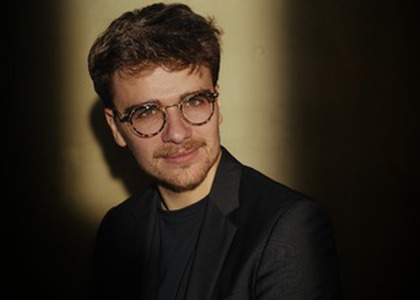> Interviews

Interview with pianist Andrei Gologan (III)
The pianist Andrei Gologan will give an extraordinary recital on Wednesday, November 13th, 2024, in the Great Hall of the Romanian Athenaeum as part of the series "The Heirs of Romanian Music," organized by Radio România Muzical and the Rotary Club Pipera. In the third part of a conversation with our colleague, Ioana Țintea, Andrei Gologan shares more details about his debut on the Athenaeum stage, as well as other aspects of his artistic journey so far.
The recital's theme is "The Music of the spheres". The concept leads us back to Pythagoras, who believed that planets in their movement across the celestial spheres produce harmony. What inspired you to choose this theme and how does it transpire in your repertoire selection?
I often think about the music of the cosmos, it seems a bit too complex, but, truly, when I make music I try to detach myself from everything that means earth, everything that means material and I try to discover certain spheres that which we cannot discover in our day to day life. And music is truly the key to this universe of the unknown, so to say.
In recent years, I have been very drawn to composers whom I consider capable of allowing us to enter these spheres. I will present only some of these composers in the recital on November 13.
Yes, I am very excited! It's an unusual program, one that allows us not necessarily to meditate-since that might not be the exact word-but to enter a different kind of world.
Let's talk about the works you'll present on the Athenaeum stage. These are pieces by composers with very diverse styles-from Brahms and Enescu to Komitas and Scriabin. Do these have a particular significance?
Yes, their musical styles are indeed very diverse, but I believe they are united, at their core, by this search for something beyond, for the spheres, of course-a musical realm that we, as humans, cannot perceive in our daily lives.
I will begin the recital with Komitas' works. Actually, I combine them with works of Skriabin. Both composers attracted by mysticism, both curious to discover another vision regarding our world. And this exact mysticism, this relative simplicity with which they develop musical elements fascinates me; they are totally different. Komitas is close to monophony, while Skriabin can become extraordinarily complex. However, it is this exact search for sounds that do not belong to this earth that I believe unites these two composers. "And, of course, this meditation, this search for new sounds will be crowned by Enescu's Pavana, an incredibly important piece for all of us. Then, as a finale to the recital… Brahms' extraordinary Sonata in F minor, composed in his youth. I truly cannot imagine the kind of personality he must have had to write such a work-almost 40 minutes of music that is not just global, but universal! In this piece, Brahms includes entire pages where we simply meditate, search… it's truly an extraordinary opus. I believe these four composers will come together in a very pleasing way."
You have a very profound bond with Romanian music, and Enescu is a central piece in your repertoire. What does it mean for you to play Enescu's works in Romania, especially on the Athenaeum's stage- a symbol of Romanian culture and a place of great historical memory?
I try not to be subjective when I say that Enescu was one of the most important composers, one of the geniuses of the past century-maybe even of the past few centuries. He was an extraordinary man! I truly believe I'm not saying this subjectively. I love his music, I love his genius. It's truly unbelievable what this man was able to compose.
Yes, I am indeed very passionate about Enescu. Recently, I performed his Third Sonata 'in the Romanian folk style' for violin and piano, and once again, it's absolutely astounding how a person can translate his thoughts onto paper and create such a masterpiece. I've often played Enescu's solo piano pieces, as well as a great deal of his chamber music. He holds a very important place in my repertoire and in my life, and, as you can imagine, returning to Romania and performing Pavana on the Athenaeum stage-a piece that may even be among the first of Enescu's works I learned-is not just special; it's a moment I eagerly look forward to!
Translated by Sorana Andreea Dumitrescu,
University of Bucharest, Faculty of Foreign Languages and Literatures, MTTLC, year I
Corrected by Silvia Petrescu














